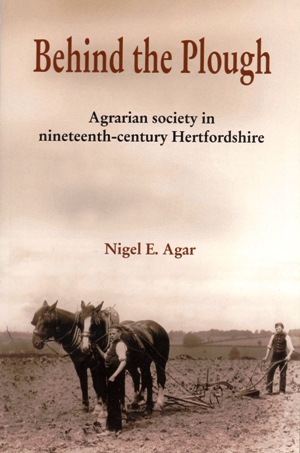Behind the Plough
Agrarian society in nineteenth-century Hertfordshire
by Nigel E. Agar
Published by University of Hertfordshire Press, 2005
Paperback, 203 pages, with maps and pictures
ISBN 9 780954 218959
In Behind the Plough, agricultural historian Nigel Agar surveys a century of agriculture in Hertfordshire. The nineteenth century saw changes in agriculture just as dramatic, in their way, as the developments taking place in industry. Throughout the period under consideration, Hertfordshire was almost entirely rural but its proximity to London meant that it was in no sense isolated. Indeed, the needs of the capital influenced the way agriculture was carried out in the county. What few industries Hertfordshire had were also largely based on farming: brewing and malting were important whilst straw plaiting supplied the basic materials for the hats made in Luton. A modern observer would no doubt think the nineteenth-century countryside very crowded. Before mechanisation, farming was labour intensive and groups of toiling workers, often accompanied by women and children, were everywhere to be seen. Threshing machines and reaper-binders, as well as steam power, were introduced in the second half of the century, signalling a step change in agriculture. Another such seismic change was the development of artificial fertilisers by John Bennett Lawes of Rothamsted, giving substance to the claim that modern farming was invented in Hertfordshire. Nigel Agar covers key areas in detail, including land enclosure, the prevailing social hierarchy, village life, the development of agricultural machinery, pauperism, and the attempts to set up trade unions amongst farm labourers. Illustrated with historic photographs and extracts from documents, Behind the Plough gives a full and fascinating picture of farming life in Victorian Hertfordshire. Dr Nigel Agar is a qualified historian who has taught history in Hertfordshire since 1963. After gaining a degree in History from Cambridge, he went on to earn a PhD from the University of East Anglia with a thesis on Employment and Community in nineteenth-century Bedfordshire and Hertfordshire. He is the author of The Bedfordshire farm worker in the nineteenth cent/try (1981), and has contributed to various other publications including Hertfordshire in History (also published by Hertfordshire Publications). He was elected to Hertfordshire County Council in 1993. |
- Introduction
- Population
- Enclosure of the land
- The development of agriculture up to the great depression
- Farm machinery in Hertfordshire
- Rural pauperism
- Landlord, tenant and labourer in the era of high farming
- Landed society
- Forestry
- The village community
- Housing in rural Hertfordshire
- The labourer's diet and health
- Trade unions and pressure groups
- Depression in agriculture
- Conclusion
| Locating
Books At the time this page was last updated new and second hand copies were available online |
Page created November 2007
